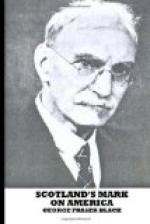SCOTS IN THE NAVY
John Paul Jones (1747-92), perhaps the most famous Scottish name in the annals of the American Navy, was the son of a Scottish gardener, and was born at Kirkbean, Kirkcudbrightshire. The details of his naval career are so well known that there is little use of repeating them here. James Craig (1735-1800), a Scot, Was appointed by Congress a Commissioner of naval stores in 1776. He was owner of a number of armed privateering vessels, took several prizes, and also aided in fitting out several other vessels as privateers. The Nicholson family, of Scottish parentage, was famous in the naval annals of the United States for three generations, from the Revolution to the Civil War. Alexander Murray (1755-1821), grandson of a Scot, took an active part in the naval battles of the Revolution and commanded a squadron against the Barbary pirates in 1820. John Rodgers (1771-1838), of Scottish parentage, had a distinguished part in the war against Tripoli, the government of which he compelled to sign a treaty abolishing slavery of Christians and the levying of tribute on European powers. In the war of 1812 he fired the first gun, June 23, 1812, at the British frigate “Belvidere.” He was afterwards offered, but declined, the office of Secretary of the Navy. George Campbell Read (c. 1788-1862), Admiral, of Ulster Scot descent, took part in the fight between the “Constitution” and “Guerriere” in 1812. Isaac McKeever (1794-1856), Commodore and Commandant of the Navy Yard at Portsmouth, Virginia, was of Scottish parentage. John Berrien Montgomery (1794-1873), descended from William Montgomery of Bridgend, Ayrshire (1701), served in the War of 1812, the Mexican War, and while too old for active service in the Civil War, was in charge of Boston Navy Yard, then one of the most important supply stations of the navy. Rear Admiral Andrew Bryson (1822-1892), of Scottish descent, took part in Civil War, and retired after forty-three years’ continuous service. John McIntosh Kell (1823-1900), Executive Officer of the Confederate Cruiser “Alabama”




